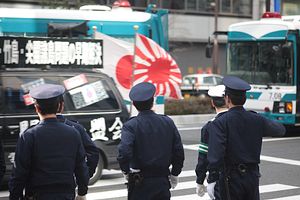A second U.N. body has highlighted growing concerns about hate speech in Japan, particularly that targeted at the ethnic-Korean community. The U.N. Committee on the Elimination of Racial Discrimination on Friday urged the government to regulate hate speech. This follows a similar recommendation in July by the U.N. Human Rights Committee. In addition to better regulating the public anti-Korean demonstrations that are seen near government buildings in Tokyo and Osaka, the panel also recommended “further efforts to address the issue of ‘comfort women,’” and noted that public and online hate speech was “not always properly investigated and prosecuted” by the government.
The ruling LDP administration has started to become sensitive to the international attention this issue is beginning to attract, particularly in the run up to the 2020 Olympics in Tokyo. On August 28 the LDP had its first project team meeting to discuss the issue. The team meeting was in response to Tokyo Governor Yoichi Masuzoe’s meeting with Prime Minister Shinzo Abe on August 7, in which the governor asked Abe to legislate against hate speech. Aside from seeking to limit the negative attention such protests could attract to the Olympics, the government is also concerned that these protests are increasingly happening near public buildings like the Diet and the prime minister’s office. “The possibility of problems arising from such activities, such as right-wing sound trucks and weekend loud protests near the prime minister’s office, could interfere with normal government operations,” said Masahiko Shibayama, deputy chairman of the project team.
However, some are concerned that the government’s attempts to legislate against hate speech and “loud protests” could also be used to limit other activities, like anti-nuclear protests. At a protest on Saturday near the Diet, where 7,000 demonstrators met in opposition to the restart of Japan’s nuclear reactors, several people voiced their concern about the government’s proposed legislation. While speaking with the Asahi Shimbun, Emiko Mizuno said “I feel anger at and fear over the fact that, in the ruling party, there are people who cannot distinguish sound criticism against the government from the acts of racial discrimination.”
The project team appears aware of situation, with team leader and Diet member Katsuei Hirasawa saying “By looking into actual conditions (of hate speeches), we want to consider whether the government can deal (with them) under the current laws or if new laws are needed.” However, LDP policy chief Sanae Takaichi said, “When I am in the LDP headquarters building (located near the Diet building), there are times that I cannot concentrate on my work for many hours.” Whether the government will be able to effectively distinguish between hate-speech directed at minorities and regular, constitutionally protected protests through legislation will be difficult.

































